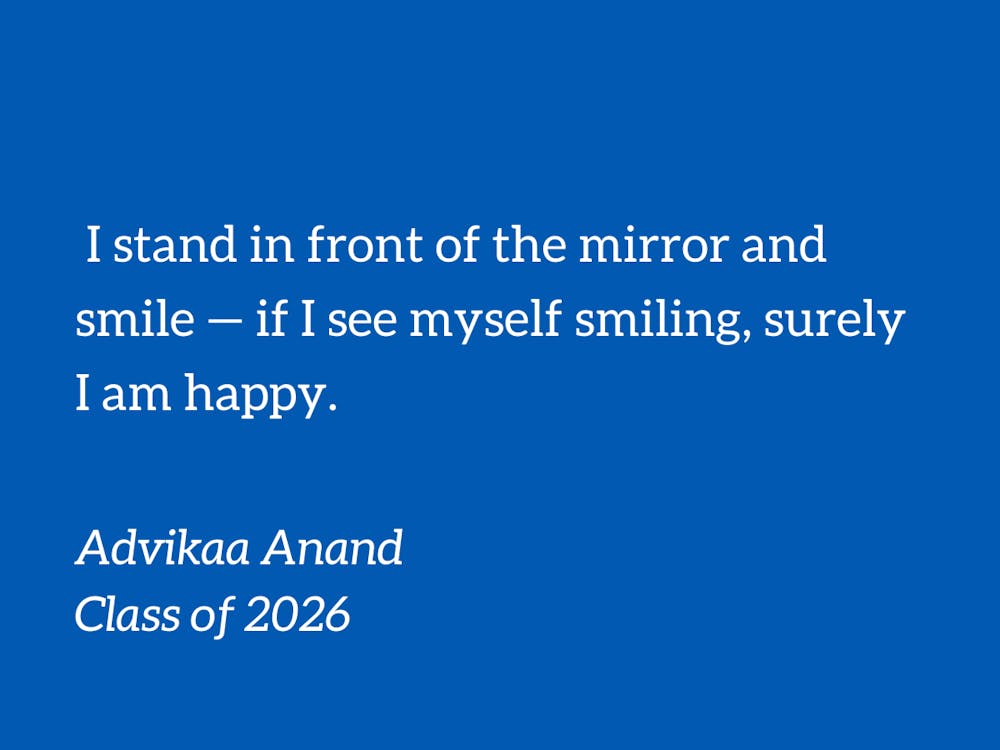Have you ever noticed how hard it is to have a bad day in the spring? As trees flower with iridescent blossoms, forsaking their wintery nakedness; as a supple wind weaves through the dancing grass; and as the sun sweeps over the cold earth, every atom comes alive with new life. Your feelings feel trivial compared to this miracle of nature, and the whole world feels complacent in a conspiracy to uplift you.
Yet, your heart still feels like a weight, sinking deep within you and refusing to take flight in the winds of spring.
Recently, even as I relish the warm days inching over campus, I’m plagued by midterm exhaustion, and I’ve been having more bad days – days when the temptation to frown far overshadows the reasons to smile.
On these days, the knowledge gleaned from my high school study of psychology floods my mind, and I alter my perception of negative occurrences, telling myself how they can be bettered or how they are not completely catastrophic. I try to practice embodied cognition, harnessing the intrinsic connection between my body and mind. I stand in front of the mirror and smile — if I see myself smiling, surely I am happy.
But what happens when this attempt at positivity becomes toxic?
Contending with the ramifications of this harmful practice becomes difficult in a culture that perpetuates a tyranny of false positivity. Our reactions to others’ harrowing circumstances often consist of flimsy reassurances that diminish the gravity of their experiences, making them feel foolish and stupid for even daring to feel that way.
Ultimately, toxic positivity functions as a reactive emotion, a response “to your own or someone else’s suffering that comes across as a lack of empathy.” Though toxic positivity often isn’t intended to cause harm, it can dismiss emotions instead of affirming them, ultimately invalidating whatever sentiments the individual was courageous enough to share with you.
Perhaps more poignantly, this dismissive, invalidating approach to emotions can compel the individual to engage in self-gaslighting. As they reflect once more on their painful experiences, not only do they become saddled with guilt, pondering ways in which their own actions produced their plight but they also become forced to relive their trauma, which can further exacerbate whatever circumstances are haunting them.
Toxic positivity can also ruin your relationships, dampening your ability to connect with other people. As you champion your own values over what they need from you, you stymy an emotional mechanism that is organic and vital. Negative emotions, no matter how uncomfortable they might make us, are important. They operate as a warning system, “letting us know that there is something we need to acknowledge and address.” Though positive emotions are also essential, “problems arise when people believe that they must be upbeat all the time.” Moreover, “new research shows that experiencing accepting such emotions is key to our well-being” because misery is meaningful.
After all, we damage people when we champion upbeat positivity in circumstances where it’s okay to be anything but – circumstances of difficult health diagnoses, circumstances of reckoning with traumatic human experiences, such as experiencing physical or psychological harm, circumstances of losing a loved one. We tell them that only their outward display of strength is valued, that emotional authenticity marks them with weakness and makes us uncomfortable, and therefore, for our sake, they must betray their own feelings and be positive.
Toxic positivity hurts us: it hurts when our hearts are crammed into positions in which they weren’t meant to be because our hearts were not made to be hushed; instead, they were meant to be heard.
I have always been a very emotional person, endowed with the curse of feeling everything so very deeply. This quality has made me an overthinker. I am so astute in every single human emotion that I often exhaust myself pondering how my actions make others and myself feel.
It has also made me lonely. As I am overflooded with powerful feelings in my day-to-day life, I often convince myself that no one else can possibly understand what is in my heart. Although I know I have those with their ears forever in my arms, these moments of catharsis blind me to this fact and then isolate me, convincing me that the burden of my emotional intensity is for me to bear alone.
But for all the adverse consequences of this curse, it has also made me a writer. Convinced that no one else will understand what’s in my heart, I often turn to paper, and I am amazed at its unyielding patience. I know that my feelings have found a receptacle that will not reject them; instead, the paper and the pen will help reshape them, bringing me to true positivity only after I have fully reaped the advantages of negativity.
My sentimentality is what brings me before you because it enables me to enliven my thinking with feeling. It is at this crossroads of my heart and brain that my creations of connection are born, so if to feel with every nerve in my body is to be cursed, then I am blessed by this curse.
Advikaa Anand is a Trinity freshman. Her columns typically run on alternate Thursdays.
Get The Chronicle straight to your inbox
Signup for our weekly newsletter. Cancel at any time.
Advikaa Anand is a Trinity sophomore and an opinion managing editor of The Chronicle's 119th volume.

